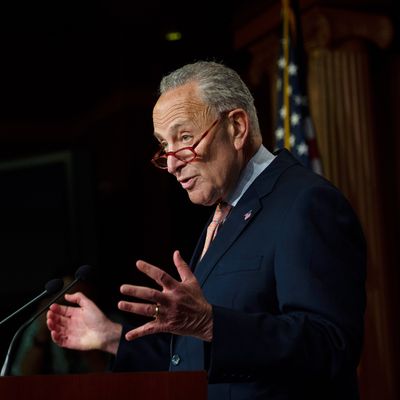
Sometimes we talk as though the big, ambitious plans of presidential candidates determine what will happen if they enter the White House. For instance, on health-care policy, the debate has revolved around the fact that two of the three dominant Democratic presidential aspirants for 2020, Bernie Sanders and Elizabeth Warren, favor a single-payer Medicare for All system that will sweep away the rickety superstructure of Obamacare along with private health insurance. But it is their Senate colleagues who will determine what actually happens in 2021 (assuming Democrats keep effective control of the House).
If Republicans hang on to the Senate — and that’s currently the best bet in a tough landscape for the Democrats, even if they take the White House — then the odds of progress on health care or much of anything else will depend on somehow persuading Mitch McConnell (assuming he’s reelected in 2020) to abandon the obstructionist tactics he used to such great effect when Barack Obama was president. Yes, a Sanders or Biden or Warren (or any other Democratic) administration will be able to reverse the regulatory damage inflicted by Team Trump on Obamacare and Medicaid and make some regulatory improvements of its own. Anything beyond that will be tough sledding.
But if Democrats do flip the Senate, they will need a plan on health care that has a fighting chance to get through what will still be a closely divided chamber. And as Ezra Klein explains after talking with some key Senate Democrats, the plan will not be Medicare for All:
“I understand the aspirational notions around Medicare-for-all, but if there’s one thing that I think we still have to wrestle with, it’s that Americans want to see more of their fellow citizens covered but they are very nervous about losing what they have,” says Sen. Mark Warner (D-VA). “There’s a huge risk aversion.”
[Sherrod] Brown, who has long supported single-payer, agreed. “I think you want people to have choice still,” he says. “You don’t want to take people’s insurance away. A lot of people don’t want government insurance. I understand that.”
On the other hand, it wouldn’t be accurate to say that Senate Democrats simply want to defend and cautiously extend Obamacare. They are basically inclined to go back and retrieve elements of the original architecture of the Affordable Care Act that were dropped due to industry opposition (e.g., health insurers’ objection to a Medicare buy-in option for people nearing but not at retirement age), or in the vain hope of securing Republican support.
[T]he three most oft-mentioned policies were the three ideas that Democrats tried to include in Obamacare, only to sacrifice them at the altar of 60 votes.
First is lowering Medicare’s eligibility age to 50. Brown negotiated a similar proposal — lowering the age to 55 — for Obamacare, but it died when Sen. Joe Lieberman swore to torpedo the entire bill if it dropped the Medicare eligibility age. The bitterness of that betrayal lingers….
Second is the public option, which was excised from Obamacare. “We passed a public option in the Finance Committee in 2009,” says [Ron] Wyden, sighing. “We lost it on the floor….”
Third, Senate Democrats lament that Obamacare didn’t do more to cut costs for the already insured. “I think if you look back on what happened, it’s clear Congress should have gone much further when it had the chance and had a laser-like focus on holding health care costs down — period, full stop,” says Wyden.
On the cost front, the most universally accepted (among Democrats, and perhaps even a few Republicans) idea is to let Medicare negotiate drug prices.
So what we are looking at for 2021 if Democrats win both the White House and the Senate is a major, not a minor, Obamacare fix and a health-care cost-containment push. The fact that it would create a stronger Medicare and a public option under Obamacare means that this agenda is not inconsistent with a later effort to pass Medicare for All, but it’s not in the cards for the next Congress or two (particularly given the likelihood of Democratic losses in the first midterm after a presidential win).
And even an Obamacare fix will require not just a Democratic Senate (and some way to bring pressure on potentially recalcitrant Democrats like Joe Manchin) but a strategy for overcoming a Senate filibuster. Elizabeth Warren (and dark-horse candidate Steve Bullock) is foursquare for just killing the ancient and disreputable dilatory tactic, though Sanders and Biden (and other candidates in the race) are at best ambivalent about it —not a very auspicious start for filibuster reform given the resistance among Senate Democrats that already exists. If the legislative filibuster is still around, then another health-care push will require that Democrats fit their plans into a budget-reconciliation bill that can be passed with a simple majority. And as Republicans showed during their agonizing and ultimately unsuccessful 2017 effort to repeal and replace Obamacare, using reconciliation can narrow the scope of reforms (anything purely regulatory is off-limits for reconciliation) without guaranteeing victory.
So anyone harboring the illusion that a Democratic presidential win in 2020 means an immediate push for Medicare for All needs to get a grip. Yes, would-be president Bernie Sanders has this magical claim that if he wins he will lead a “political revolution” that will somehow overcome all the political and institutional obstacles to his agenda, and would-be president Joe Biden acts as though he didn’t learn much about the limits of bipartisanship with the Affordable Care Act was working its labored way through Congress without a hint of Republican support. More likely than not, Democrats alone will have to do the heavy lifting on health care in 2021, and more likely than not, getting reforms far short of Medicare for All enacted will be a heavy lift indeed.






























